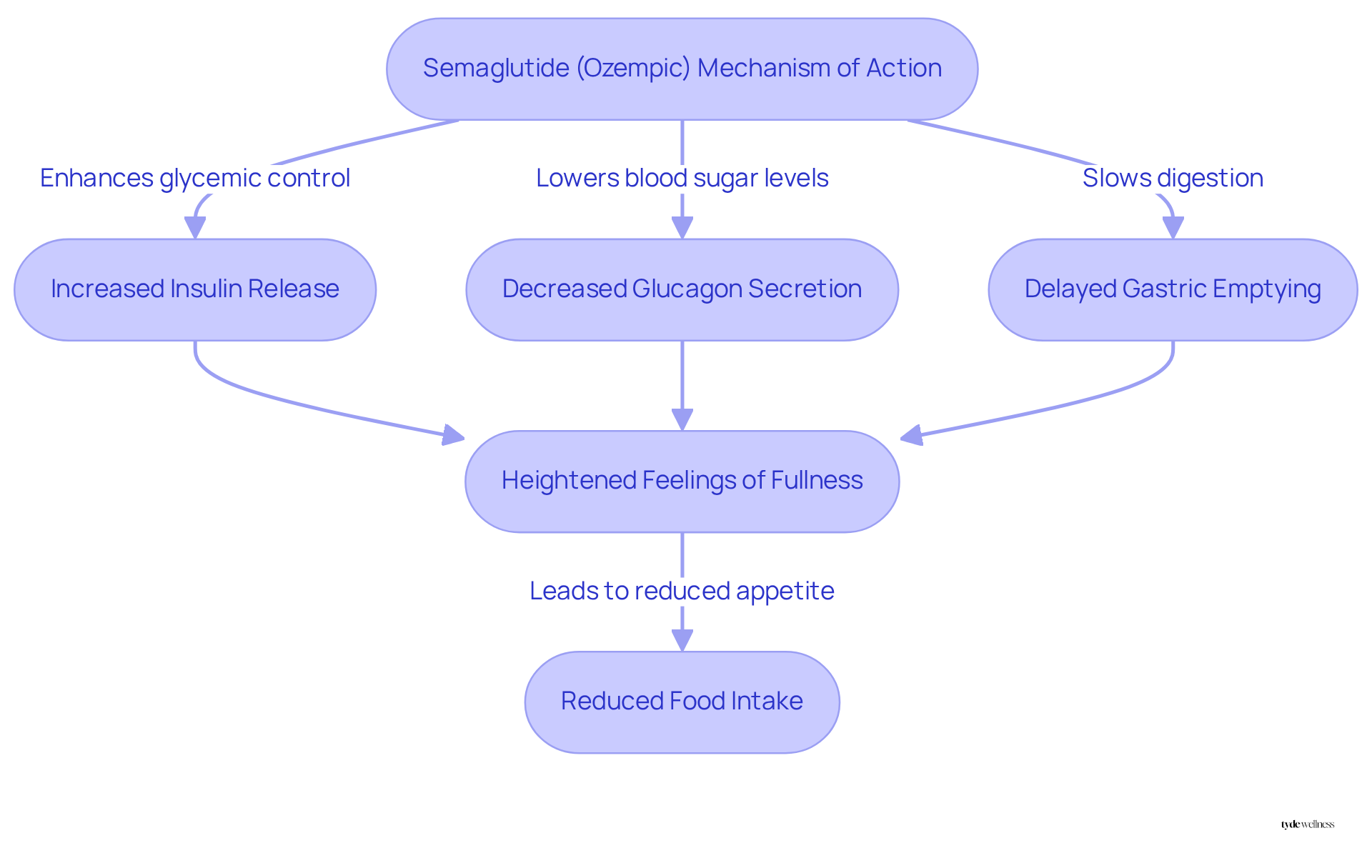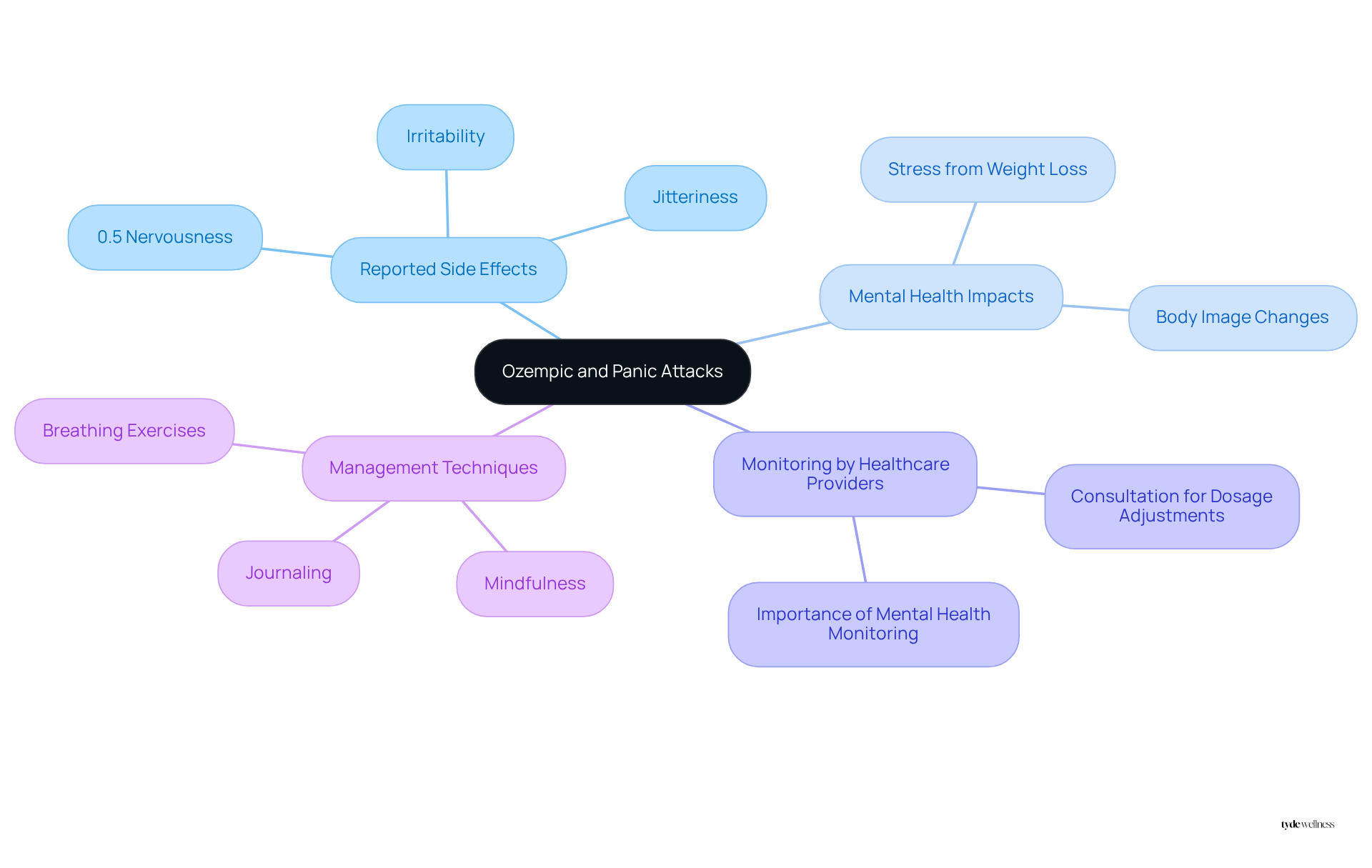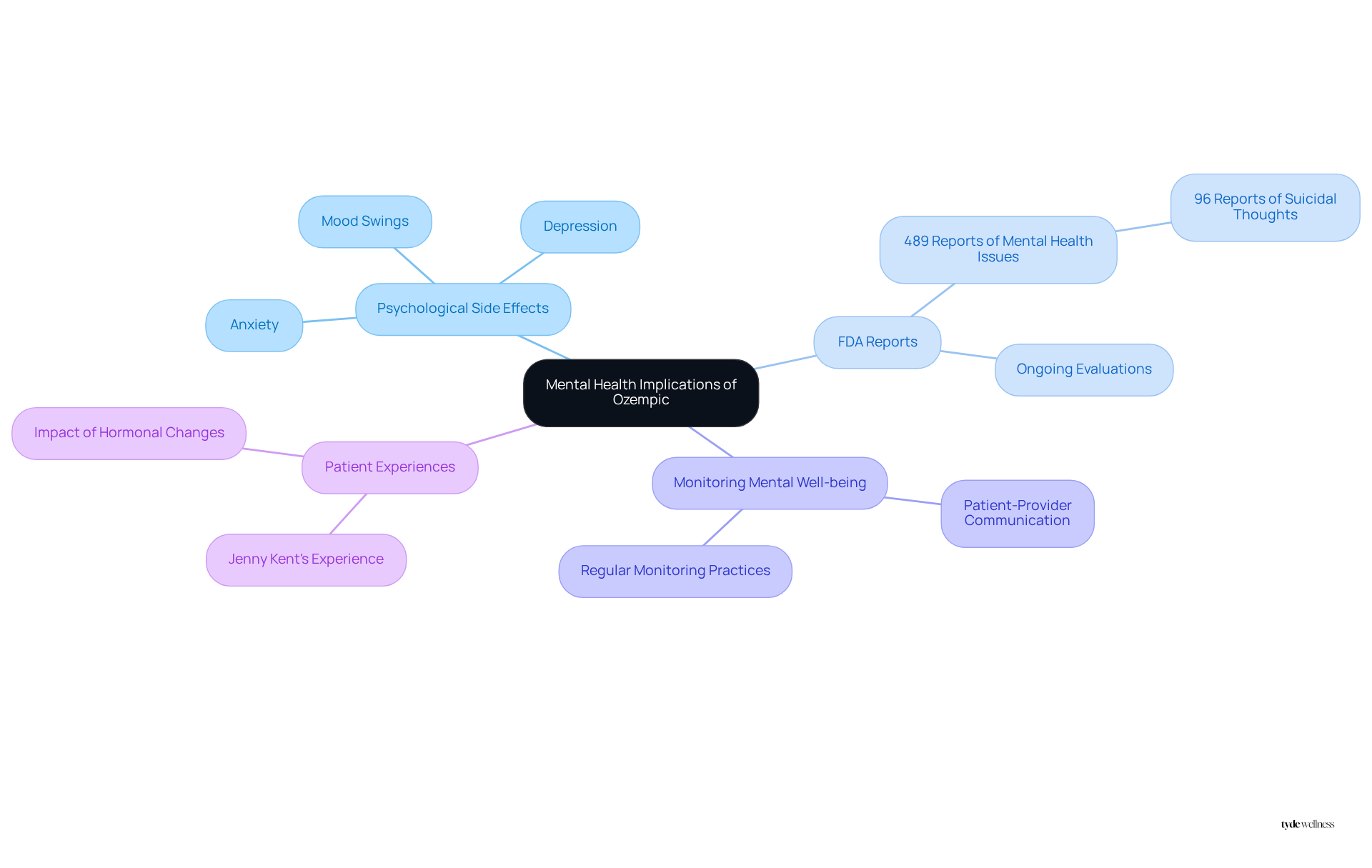Overview
Ozempic may be associated with panic attacks in some users, as evidenced by reports of increased anxiety and mood swings among individuals undergoing treatment. Fluctuations in blood sugar levels, along with the psychological stress linked to rapid weight loss, can contribute to these mental health issues. Consequently, healthcare providers must monitor patients closely for any signs of distress. This awareness is crucial for ensuring patient well-being during treatment.
Introduction
Recent advancements in diabetes treatment have brought medications like Ozempic to the forefront, recognized for their role in weight management and glycemic control.
However, as more individuals turn to this GLP-1 receptor agonist, a pressing question arises: could Ozempic inadvertently trigger panic attacks in some users?
Exploring the intricate relationship between this medication and mental health reveals a complex landscape where benefits must be weighed against potential psychological side effects, including anxiety and mood fluctuations.
Understanding this connection is crucial for both patients and healthcare providers, as it underscores the importance of monitoring emotional well-being alongside physical health during treatment.
Define Ozempic: Mechanism and Uses
Semaglutide is a glucagon-like peptide-1 (GLP-1) receptor agonist primarily used to enhance glycemic control in adults with type 2 diabetes. This medication also serves as an . By mimicking the GLP-1 hormone, which is naturally released in the intestines, semaglutide plays a crucial role in appetite control and insulin release. The activation of GLP-1 receptors results in:
- Increased insulin release in response to meals
- Decreased glucagon secretion—which typically raises blood sugar levels
- Delayed gastric emptying
This combination leads to heightened feelings of fullness and reduced food intake.
Administered through a convenient once-weekly injection, Ozempic offers a practical solution for individuals managing chronic conditions, contributing to significant weight loss and improved metabolic health. In comparison, tirzepatide, a next-generation GLP-1 medication, demonstrates even greater efficacy in appetite control and notable weight loss. Importantly, semaglutide has also received FDA approval for use in obese teenagers, expanding its applications in body mass management.
However, it is essential to consider potential side effects, such as nausea, along with the necessity for ongoing treatment to maintain weight loss benefits after discontinuation, particularly in light of concerns like whether does ozempic cause panic attacks. At Tyde Wellness, we provide personalized physician-guided care, nutrition strategies, and continuous support to ensure individuals are well-informed about the benefits and considerations of using these medications, fostering a comprehensive approach to weight loss and wellness enhancement.

Explore the Connection Between Ozempic and Panic Attacks
Recent studies and anecdotal evidence have raised concerns about whether the question of does Ozempic cause panic attacks in certain users is valid. While it is recognized for its effectiveness in weight loss and blood sugar management, its are multifaceted. Some patients have reported increased stress and wonder if does ozempic cause panic attacks after initiating treatment. Fluctuations in blood sugar levels may contribute to symptoms such as jitteriness and irritability. Additionally, the psychological strain associated with rapid weight loss and changes in body image can amplify feelings of unease.
Research indicates that although not every user experiences these adverse effects, only 0.5% of reported side effects specifically mentioned nervousness. This suggests that a significant number of users do report elevated levels of distress. Consequently, it is crucial for healthcare providers to closely monitor the mental health of patients prescribed this medication, ensuring a balanced approach to treatment that prioritizes both physical and emotional well-being.
To assist in managing anxiety, incorporating mindfulness and stress-reduction techniques, such as journaling and breathing exercises, can prove beneficial. Furthermore, recognizing the potential for addiction-like behaviors associated with weight loss outcomes is vital for understanding the psychological complexities linked to this medication.

Assess Mental Health Implications of Ozempic Use
The mental health effects of this medication are increasingly recognized in clinical discussions. Users have reported a range of , including anxiety, depression, and mood swings, leading to concerns about whether Ozempic does cause panic attacks.
Research suggests that GLP-1 receptor agonists like Ozempic may interact with neurotransmitter systems, which raises the question of whether Ozempic does cause panic attacks and potentially result in mood alterations. This consideration is especially pertinent for women experiencing hormonal fluctuations during perimenopause or menopause, as the introduction of a medication that affects appetite and weight can intensify existing mental health challenges.
Statistics show that the FDA has received numerous reports of distress and depression among semaglutide users, which leads to concerns about whether Ozempic does cause panic attacks, highlighting the necessity for vigilance.
It is essential for healthcare providers to engage in open dialogues with patients about these potential side effects, particularly discussing if Ozempic does cause panic attacks, to ensure they can identify signs of anxiety and depression. Regular monitoring of mental well-being during therapy can help mitigate risks and provide vital support for individuals, particularly in understanding if Ozempic does cause panic attacks.
Real-world experiences, such as those shared by women who have reported significant mood changes while using Ozempic, emphasize the importance of a proactive approach in managing both physical and mental health.

Conclusion
The exploration of the connection between Ozempic and panic attacks reveals a complex interplay between physical health and mental well-being. Ozempic is primarily celebrated for its effectiveness in managing type 2 diabetes and aiding weight loss; however, it is vital to acknowledge the potential mental health implications that some users may experience. Understanding whether Ozempic causes panic attacks requires a nuanced approach, considering both physiological and psychological factors.
Key points highlighted throughout the article include:
- The medication’s mechanism of action
- The reported psychological side effects
- The necessity for healthcare providers to monitor patients closely
Anecdotal evidence and research suggest that some individuals may experience increased anxiety or mood swings, particularly during significant body changes. The importance of proactive mental health management, including mindfulness techniques, cannot be overstated, as it plays a crucial role in ensuring a balanced approach to treatment.
In light of these findings, it becomes imperative for both patients and healthcare professionals to engage in open discussions regarding the potential mental health effects of Ozempic. By prioritizing emotional well-being alongside physical health, individuals can make informed decisions and seek appropriate support. This holistic approach not only enhances the overall treatment experience but also underscores the significance of addressing both body and mind in the journey towards improved health.
Frequently Asked Questions
What is Ozempic and what is its active ingredient?
Ozempic is a medication that contains semaglutide, a glucagon-like peptide-1 (GLP-1) receptor agonist used primarily to enhance glycemic control in adults with type 2 diabetes and to manage body mass.
How does semaglutide work in the body?
Semaglutide works by mimicking the GLP-1 hormone, which helps in appetite control and insulin release. It increases insulin release in response to meals, decreases glucagon secretion (which raises blood sugar levels), and delays gastric emptying, leading to increased feelings of fullness and reduced food intake.
How is Ozempic administered?
Ozempic is administered through a convenient once-weekly injection.
What are the benefits of using Ozempic?
Ozempic contributes to significant weight loss and improved metabolic health for individuals managing chronic conditions, particularly type 2 diabetes.
Has Ozempic been approved for use in adolescents?
Yes, semaglutide has received FDA approval for use in obese teenagers, expanding its applications in body mass management.
Are there any side effects associated with Ozempic?
Potential side effects of Ozempic include nausea, and it is important to consider the necessity for ongoing treatment to maintain weight loss benefits after discontinuation.
What additional support does Tyde Wellness provide for individuals using Ozempic?
Tyde Wellness offers personalized physician-guided care, nutrition strategies, and continuous support to help individuals understand the benefits and considerations of using medications like Ozempic, fostering a comprehensive approach to weight loss and wellness enhancement.
List of Sources
- Define Ozempic: Mechanism and Uses
- News: Wegovy works. But here’s what happens… (NPR News) – Behind the headlines – NLM (https://ncbi.nlm.nih.gov/search/research-news/18145)
- Most quit breakthrough weight-loss drug within a year (https://sciencedaily.com/releases/2025/09/250913232157.htm)
- The Rise of Ozempic for Weight Loss Sparks Ethical Concerns (https://columbiapsychiatry.org/news/rise-ozempic-sparks-ethical-concerns)
- Higher dose of semaglutide increases weight loss, metabolic benefits (https://utsouthwestern.edu/newsroom/articles/year-2025/sept-semaglutide.html)
- How do drugs like Ozempic work for weight loss? | School of Molecular & Cellular Biology | Illinois (https://mcb.illinois.edu/news/2024-07-09/how-do-drugs-ozempic-work-weight-loss)
- Explore the Connection Between Ozempic and Panic Attacks
- Can Ozempic® Cause Panic Attacks and Anxiety? | Mochi Health (https://joinmochi.com/blogs/can-ozempic-cause-panic-attacks-and-anxiety)
- ‘Ozempic Personality’: How Weight Loss Drugs Can Affect Your Behavior (https://healthline.com/health-news/ozempic-personality-change)
- The Mental Health Side Effects of Weight Loss Drugs like Ozempic & Wegovy – Relief Mental Health (https://reliefmh.com/blog/the-mental-health-side-effects-of-weight-loss-drugs-like-ozempic-wegovy)
- Why Do Some People Feel More Anxious or Panicked After Starting Ozempic? – Diamond Behavioral Health (https://diamondbehavioralhealth.com/blog/why-do-some-people-feel-more-anxious-or-panicked-after-starting-ozempic)
- Assess Mental Health Implications of Ozempic Use
- ‘Ozempic Personality’: How Weight Loss Drugs Can Affect Your Behavior (https://healthline.com/health-news/ozempic-personality-change)
- As Ozempic use grows, so do reports of possible mental health side effects (https://npr.org/sections/health-shots/2023/09/21/1200201186/as-ozempic-use-grows-so-do-reports-of-possible-mental-health-side-effects)
- Weight loss: Using drugs like Ozempic linked to suicidal ideation (https://medicalnewstoday.com/articles/new-study-links-semaglutide-ozempic-suicidal-thoughts)



